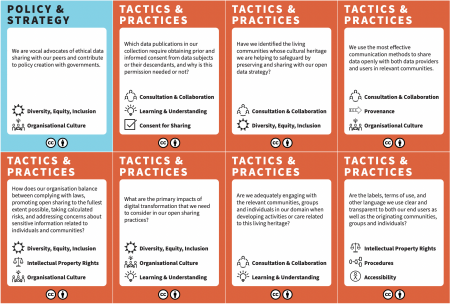The ethics of open sharing
- Tech Blog
At meemoo, we believe that content is more valuable when it’s shared, and more and more Flemish organisations and institutions are also recognising the importance of open sharing. But what about the various ethical issues that this brings with it? As a service organisation, we’re providing the necessary support, and we’re not alone – developing sustainable solutions together with an (inter)national network. In recent months, for example, meemoo has been actively involved in the Creative Commons Ethics of Open Sharing working group.
This has resulted in a card game that is designed to initiate conversations about ethics within your organisation and sharpen up your critical thinking skills – all in an accessible way.
What is open sharing and what ethical issues are involved?
Open sharing means making cultural heritage content and the knowledge around it freely available and accessible to the general public, so everyone can enjoy the wealth of information. This may be a noble goal, but opening up content does not come without its challenges, not to mention the ethical issues you need to take into account. This doesn’t just involve how you handle intellectual property rights, but for example also how you deal with ecology, policy, permission, bias, inclusion and diversity, collaboration, and transparency.
It’s not easy for heritage organisations to gain a complete picture of all the factors at play on their own. So, given that ethics is a current topic at meemoo, and that we regularly collaborate with other (international) organisations on this matter, we’re doing our best to support them in this regard. This is why meemoo colleague Bart Magnus was one of the leaders in the Creative Commons Ethics of Open Sharing working group, which identified all the relevant ethical issues related to dealing with open data, and compiled everything into a handy and accessible tool: an ethical card game.
We presented the game to the public in a webinar on 14 April, and the conversation continued from the specific perspective of intangible cultural heritage (living heritage) within the Wiki Loves Living Heritage project. To find out more about this topic, watch the recording with guest speakers such as Melissa Shaginoff from Smithsonian and Mehtab Khan from Yale Law School here.
Play it yourself!

CC BY 4.0, attribution to the Creative Commons working group ‘Ethics of Open Sharing’ and KRUT.
Who can play the game? Institutions that manage collections and want to make informed and balanced decisions based on different opinions.
Aim of the game? To help organisations think critically about the ethics of open data and open sharing through statements and questions in a game format.
What’s it good for? The game encourages players to collaborate and communicate openly with each other.
For example, here are some conversation starters:
We prioritise open sharing to achieve our goals, while also identifying areas where we can improve in the future.
What are the criteria for using (semi-)automated metadata creation techniques (such as handwritten text recognition, optical character recognition, image recognition, speech-to-text or NLP) on our collection in an ethical and effective way?
Are we aware of the ecological footprint that we leave behind with our open sharing activities? And is there a plan to reduce it?
Do we proactively address historical biases and inaccuracies in our collection data (due to colonialism, racism, political oppression, gender, sexual orientation, religion...)?
We carefully consider the most appropriate platforms for sharing our data.
You can easily download and print the playing cards yourself. Or, if you would prefer to receive a physical set from us, contact our colleague Bart Magnus at meemoo, so he can add you to the list. The game is only available in English.
The set is versatile and can, for example, be played using these rules:
Ideally, you play with 2 to 6 players. This keeps discussions manageable.
Shuffle the deck of cards and deal five cards to each player.
The first player chooses one card, reads it aloud, and explains their own opinion on the topic.
The other players ask questions, provide feedback, and finally share their own opinions.
The conversation continues until all players reach a consensus.
The first player places the played card in a separate discard pile and replenishes their hand.
Now it’s the next player’s turn. Repeat this process until all cards have been played.
Enjoy the game!
Can’t get enough of ethics?
Then we would like to refer you to some additional reading material. Ethics is also a topic that concerns us within our own operations. For example, in the FAME and GIVE metadata projects, we’re focusing on technologies within artificial intelligence to automatically generate metadata. These technologies need to be handled with caution, however, especially when it comes to facial recognition. You can read about our experiences and ideas in several publications:
The Creative Commons Ethics of Open Sharing card game was made possible with special thanks to co-organisers Isaac Oloruntimilehin (Wikimedia) and Bart Magnus (meemoo), and in collaboration with Edith Leblanc, Amanda Figueroa (Curationist), Shanna Hollich (Guthrie Memorial Library, Creative Commons), Susanna Ånäs (AvoinGLAM), Prof. MI Subhani (ILMA University, Creative Commons), Björn Wijers (PublicSpaces), Brigitte Vézina (Creative Commons), Kathryn Kure (CC South Africa and STEAM Foundation), Suzanna Marazza, Ngozi Osuchukwu (Madonna University Nigeria), Lucy Crompton-Reid (Wikimedia UK), Freyja van den Boom (Postdoc Researcher Law, Ethics and Technology), Stuart Prior (Wikimedia UK), Jorijn Neyrinck (Werkplaats Immaterieel Erfgoed), and meemoo colleagues Sam Donvil and Ellen Van Keer.
This blog is based on ‘Collaborate, Communicate and Navigate Ethical Considerations with the Ethical Sharing Card Game’ by Isaac Oloruntimilehin.
